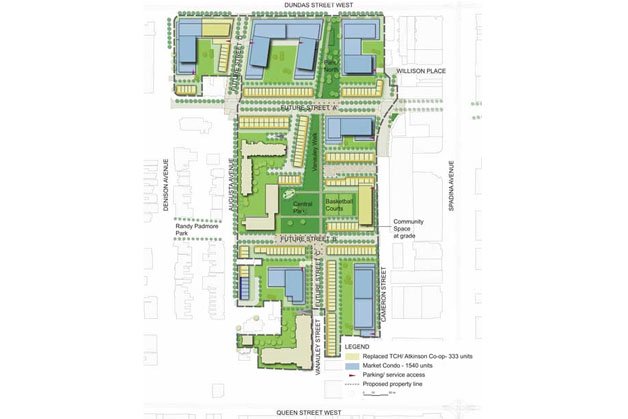
When the condo-dwellers move into Alexandra Park, will they come as neighbours, or invaders?
Earlier this month, city council okayed the revitalization of the community housing project just south of Kensington Market. The plan would see major improvements to Alexandra Park, including the replacement of all 333 of its townhouses and renovation of its 473 apartment units. A new community centre, two new public parks, pedestrian spaces, street level retail, and three new streets to open up the isolated neighbourhood to the surrounding districts are also part of the project.
But for Toronto Community Housing to pay for it all, the 2,500 residents of the tight-knit, low-income community will have to accommodate some new arrivals: the tenants of at least 1,540 condo units. The city-run housing agency, which owns the Alexandra Park property, will lease or sell part of the land to build condos in towers as high as 17 storeys, and use the resulting proceeds to overhaul the aging 44-year-old Alexandra Park complex.
While there is optimism about the 10-15-year plan known locally as “the Revite,” some in the neighbourhood are expressing anxiety that the newcomers will create a two-tier community in Alexandra Park.
Obaid Wahidi, a 19-year old tenant who’s spent most of his life in Alexandra Park, says he and other local young men are already frequent targets for “harassment” by the police. He fears the situation could get worse with the arrival “higher class” people.
“They don’t want people with previous criminal records to live in the area after ‘the Revite,'” Wahidi says, adding that he himself has never been in trouble with the law. “They think that if the police come here and come hard, they’ll get everyone in jail.”

Marwa Eldardiry, acting chair of the Atkinson Co-op to which roughly half of Alexandra Park’s tenants belong, says she’s heard similar concerns, even from young children.
“They were worried. They were like, ‘are rich people going to move in and look down on us?'” she says, with a laugh. “I basically explained to them that it’s going to be people who are actually willing to live with people who [pay subsidized rent].”
Eldardiry and other architects of the revitalization are hoping that condo tenants will recognize the unique situation they’re buying into and will come together with current residents to create a single mixed-income neighbourhood, something seen as essential to building healthy social housing.
While the new shared public space, and streets linking the area to the rest of downtown might help with integration, Eldardiry believes it will take much more than physical changes to create a economically diverse community in Alexandra Park.
“The bricks and mortar, [just putting] in a bunch of buildings and putting these people together, is not going to create a healthy social mix if you ask me,” she says.
She’s pushing for a social development plan to accompany the physical revamp.
Adam Vaughan, the area councillor who’s championed the revitalization, hopes the condos will eventually be filled by young people who are growing up in Alexandra Park today. The community has a stellar track record of producing college graduates, he says, but with the current lack of market rent units anyone successful enough to move out of social housing has no choice but leave the neighbourhood.
“Quite often, affluence evicts you,” he says. “What we hope to see happen is […] the best and the brightest and most successful in the community actually have a place to live in the community.”
Alexandra Park is not the first social housing complex to attempt to harness Toronto’s condo boom to pay for overhauling its housing stock. The Regent Park redevelopment is already underway, and a similar project in Lawrence Heights was approved last November.
But while Regent Park’s mixed-income model is already showing promise – the deeply stigmatized neighbourhood has seen the return of important amenities like banks and grocery stores – there are risks to financing redevelopment through condos.
“If your entire financial model is based on the condo market continuing to perform at a very high level for the next 10 or 15 years, you’ve got to ask, what’s plan B when or if the condo market stops doing that?” says Michael Shapcott, director of housing for the Wellesley Institute, a non-profit policy group.
Shapcott warns that the Alexandra Park project would be endangered if Toronto’s hot real estate market “corrects itself” in the next few years.
“Regent Park got in under the wire, and whether Alex Park will get in is another question,” he says.
The problem is complicated by the fact that Alexandra Park’s revitalization will take longer than it otherwise would because tenants negotiated a “zero displacement” clause that means all residents will remain on-site during construction, if they choose.
Tenants wanted assurance that nobody would be pushed out of the community, which sits in a highly desirable location in the centre of downtown. But the multi-phased process of shuffling families in and out of vacant units while their own homes are replaced will delay completion.
Vaughan concedes the condo-financed model puts the project in “a precarious” position, but says he’s confident the residential market downtown will remain strong enough to support the revitalization. He says the community has little choice but to look to the real estate sector for funding, given that neither the city nor the province has shown any sign of committing more money for housing, and Canada remains one of the few wealthy countries without a national housing strategy.
“To not do something would be to watch these houses fall down on top of the people living in there. And that’s not an option,” he says.














